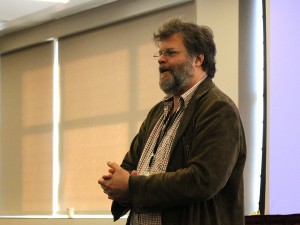- Slug: Research Center,450
- Photo available (thumbnail, caption below)
By SAMANTHA INCORVAIA
Cronkite News
TEMPE – Agriculture, urbanization and health sciences are only a few of the many issues usually considered separately by policymakers.
But to leaders of a new research center at Arizona State University they intertwine in ways that can lead to a better understanding of how challenges span biological and social systems.
“People should care because what we’re trying to do is work a foundational base for the type of knowledge that is needed to actually solve the problems we have,” said Manfred Laubichler, director of the ASU-SFI Center for Biosocial Complex Systems.
ASU and the Santa Fe Institute, a Santa Fe, New Mexico-based nonprofit research institute specializing in the study of complex adaptive systems, launched the center last week.
Its guiding principle: In a biosocial complex, researchers cannot separate issues of the natural world from those of the social world. So in a sense, all problems faced by humanity and their solutions are challenged by the center’s research.
“One particular aspect of this is you can’t just look at the situation as it is now,” Laubichler said. “You also have to understand how we get to where we are. Because that’s a mistake made in politics.”
David Krakauer, who will replace the current president of the Santa Fe Institute in August 2015, said that consensus is a problem when examining social complexities. He said the social world is the least well-understood and the least easy to predict or control.
“I think it’s an issue about being sophisticated about the future,” Krakauer said. “The world that we live in today allows us to predict if the world we are living in tomorrow is going to go away.”
The center will pair researchers at ASU and those at the Santa Fe Institute, with ASU providing support for the collaboration including faculty hiring, graduate and postdoctoral fellowships, workshops and faculty exchange visits.
Jennifer Dunne, vice president for Science at the Santa Fe Institute, said the research will be carried out in various ways such as workshops and study collaborations. She said leaders of the collaboration want to draw more people into the research from a wide variety of fields, from government officials to scientists.
“I hope it provides an excellent framework and foundation for more of these kinds of collaborations,” Dunne said. “I think there’s more opportunities for institutional sorts of affiliations in the area of complex systems research.”
^___=

Manfred Laubichler, director of the new ASU-SFI Center for Biosocial Complex Systems, discusses the research collaboration between the university and the Santa Fe Institute at a news conference. (Cronkite News Photo by Samantha Incorvaia)